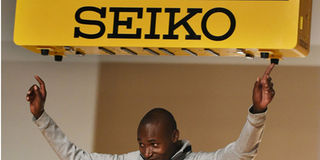World Marathon Majors introduce strict anti-doping rules

Tokyo Marathon 2014 winner Dickson Chumba of Kenya gestures underneath the clock displaying his victory course-record time of 2 hours 5 minutes 42 seconds during the Tokyo Marathon 2015 press conference in Tokyo on February 20, 2015. The marathon will be held on February 22, with 35,500 runners taking part. PHOTO | TOSHIFUMI KITAMURA |
What you need to know:
- The marathon — which starts at 3am (Kenyan time) on Sunday — will be televised in 65 countries.
- A total of 6,000 police officers will be used to secure the race, with the Tokyo community providing 300 people to help enforce security.
IN TOKYO, JAPAN
Organisers of the World Marathon Majors series have introduced a raft of new regulations in the wake of the doping crisis affecting athletics, most significantly increasing testing among the elite runners and abolishing the lump sum payment of cash bonuses to overall winners.
Beginning with the 2015-16 World Marathon Majors (WMM) series, winners in the men's and women's competitions will no longer be paid the $500,000 (Sh45 million) jackpot lump sum but will now be paid over a five-year period at $100,000 (Sh9 million) per year “to ensure that the winning athletes stay clean over time”.
A pool of elite athletes, eligible candidates for the Majors series jackpot, will now be required to undergo rigorous out-of-competition anti-doping tests and will also have to keep a clean “biological passport” to qualify for the top prize.
The changes follow the positive EPO test on 2013-14 WMM winner Rita Jeptoo, who has since been stripped of her Majors title, with her $500,000 bonus going to compatriot Edna Kiplagat, who had finished second overall in the series.
The WMM also unveiled a new sponsor, medical services providers Abbott, with the competitions now officially being referred to as the Abbott World Marathon Majors (AWMM) series.
Sunday’s Tokyo Marathon kicks off the 2015-16 AWMM series, which will also include the Boston, London, Berlin, Chicago and New York marathons, along with the Beijing IAAF World Championships marathon race.
The 2015-16 series will end with the 2016 Tokyo Marathon. The next Majors cycle will start with the 2016 Boston Marathon and end with the 2017 Boston Marathon, and will include the 2016 Olympics marathon race in Rio de Janeiro.
“Together with the IAAF, the AWMM will create a pool of championship eligible runners who will undergo additional out-of-competition drug testing,” the organisers said in a statement issued on Friday at the launch of the 2015-16 AWMM series in Tokyo.
“Prize money payments will also be adjusted to take advantage of long-term biological mapping of athletes. Thus, the $500,000 prize awarded to the men’s and women’s champions will no longer be made in one lump sum payment and will now be paid out over the course of five years, at $100,000 (Sh9 million) each year.
“Under AWMM rules, no athlete who has been found guilty of violating any anti-doping rules enforced by the IAAF, World Anti-Doping Association (WADA), national federations or any of the individual AWMM races is eligible to win the AWMM championship title. Athletes must comply with the AWMM Code of Conduct,” the organisers added.
SECURITY THREAT
Wary of terrorist threats in the wake of the bombing incident at the 2013 Boston Marathon, organisers of this year’s Tokyo Marathon have introduced mobile cameras attached to 64 police officers, who will run along with the athletes and send real-time images to the central control station.
A total of 6,000 police officers will be used to secure the race, with the Tokyo community providing 300 people to help enforce security.
This year’s Tokyo Marathon has attracted Olympic champions Tiki Gelana of Ethiopia and Uganda’s Stephen Kiprotich.
Kiprotich, who is based in Kaptagat, Kenya, will battle with Kenya’s defending champion and men’s course record holder Dickson Chumba, who set the record here last year in 2:05:42.
Others in the field are 2013 Paris Marathon champion Peter Some (personal best 2:05.38) and 2012 Tokyo winner Michael Kipyego (2:06.48).
Kenyans in the women’s field include Hela Kirop, the 2014 Seoul Marathon winner, Commonwealth Games champion Flomena Cheyech and Japan-based Sally Chepyego.
The marathon — which starts at 3am (Kenyan time) on Sunday — will be televised in 65 countries.





